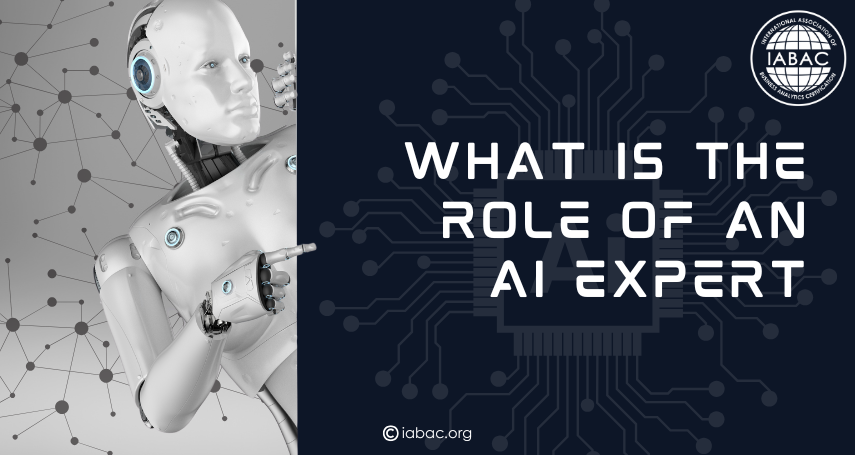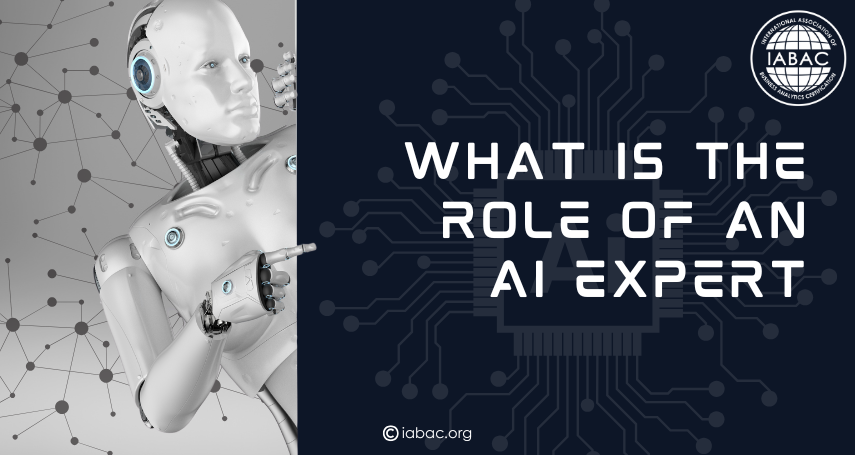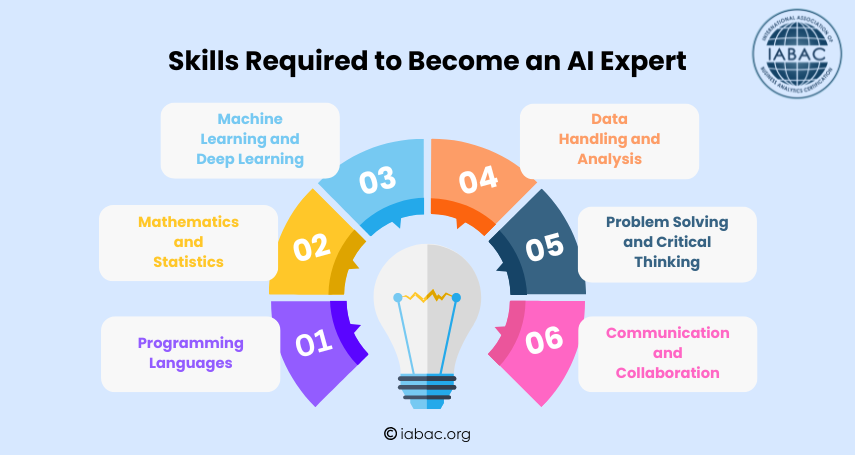What is the Role of an AI Expert? | IABAC
 seenivasan V
seenivasan V

The future of technology is being shaped by artificial intelligence, which has become a crucial aspect of our everyday life. From healthcare to banking, artificial intelligence is transforming business operations by improving process efficiency and revealing insightful information. But the people who create, develop, and apply AI solutions, AI experts, are the ones who are responsible for these developments. What does an AI specialist accomplish, though, and why is their position so important? The following post will examine the duties, abilities, and influence of artificial intelligence specialists in the quickly changing world of today.
What is an AI Expert?
A specialist in artificial intelligence, machine learning, and data science is known as an AI expert. Creating intelligent systems that can make judgments, automate processes, and learn from data is their main responsibility. Deep learning, computer vision, robotics, and natural language processing are just a few of the fields in which AI specialists operate. They are essential to the creation of models, algorithm training, and the deployment of AI in an ethical manner.
Along with proficiency in frameworks like TensorFlow and PyTorch, AI specialists usually have excellent technical abilities in programming languages like Python, R, and Java. Additionally, they possess a profound understanding of data structures, statistics, and mathematics. Experts in AI need to be able to solve problems and have a sharp analytical mind in addition to technical expertise in order to take on challenging tasks.
Responsibilities of an AI Expert
An AI specialist's responsibilities are various and include a range of duties requiring both technical and strategic expertise. Below are some major responsibilities:
1. Research and Development
Leading the way in innovation are AI specialists who are researching and creating new algorithms as well as refining those that already exist. To build AI models that are more effective, they investigate cutting-edge techniques in deep learning, reinforcement learning, and neural networks. To advance AI's potential and improve its use in various sectors, research is crucial.
2. Data Collection and Preprocessing
AI models are built on data. Data collection, cleaning, and preprocessing are the responsibilities of AI specialists in order to ensure high-quality inputs for the training of models. They use methods like feature engineering, data augmentation, and data normalization to raise the accuracy and performance of AI systems.
3. Designing and Training AI Models
Creating AI models for certain applications is one of an AI expert's primary duties. This involves selecting suitable methods, fine-tuning hyperparameters, and using big datasets to train models. In order to attain the best outcomes, AI professionals employ unsupervised, supervised, and reinforcement learning techniques.
4. Model Evaluation and Optimization
Experts in AI constantly assess model performance using a range of metrics, including F1-score, recall, accuracy, and precision. To increase models' effectiveness and make sure they generalize well to new data, they refine them. Preventing problems like underfitting or overfitting requires taking this step.
5. Deployment and Maintenance
Once an AI model is trained and improved, AI professionals monitor its deployment into production environments. They include models in programs to make sure they run smoothly in practical situations. To preserve accuracy and efficiency, AI specialists also keep an eye on the performance of models and retrain them regularly.
6. Ethical AI Development
Concern over AI ethics is growing, and AI specialists are essential to making sure AI systems are impartial, transparent, and equitable. They put policies in place to reduce bias, improve explanation, and comply to laws like the GDPR and AI governance frameworks.
Skills Required to Become an AI Expert
It takes a broad skill set that combines technical expertise, critical thinking, and problem-solving skills to become an AI specialist. Among the necessary abilities are:

1. Programming Languages
Working with machine learning frameworks and creating AI models requires proficiency in R, Python, Java, or C++.
2. Mathematics and Statistics
Understanding AI algorithms and their fundamental ideas requires a solid foundation in linear algebra, calculus, probability, and statistics.
3. Machine Learning and Deep Learning
Proficiency in machine learning techniques, including reinforcement learning, supervised learning, and unsupervised learning, is essential. Furthermore, familiarity with deep learning frameworks such as TensorFlow and PyTorch is advantageous.
4. Data Handling and Analysis
To create accurate and reliable models, AI specialists need to be proficient in feature engineering, data collection, and preprocessing.
5. Problem Solving and Critical Thinking
For AI specialists to create reliable and accurate models, they need to be proficient in feature engineering, data collection, and preprocessing.
The development of AI frequently entails resolving challenging problems. Experts in AI must be skilled in problem-solving and algorithm optimization.
6. Communication and Collaboration
Cross-functional teams comprising data scientists, engineers, and business stakeholders collaborate with AI specialists. To effectively communicate technical ideas to audiences who are not technical, one must possess strong communication skills.
Industries Where AI Experts Are in Demand
AI experts are in high demand across various industries. Some of the key sectors benefiting from AI expertise include:
1. Healthcare
AI is revolutionizing healthcare by making it possible to analyze medical images, provide individualized treatment, and detect diseases early. Experts in AI create algorithms for drug research, robotic surgery, and diagnostic tools.
2. Finance
Financial institutions use AI to automate customer care, detect fraud, evaluate risk, and trade algorithmically. Professionals in artificial intelligence are essential to improving productivity and financial stability.
3. Retail and E-Commerce
Chatbots, inventory management systems, and AI-driven recommendation systems assist businesses in streamlining operations and improving consumer satisfaction.
4. Autonomous Vehicles
AI is used by autonomous vehicles to sense, make decisions, and navigate. Computer vision and reinforcement learning models are created by AI specialists to improve vehicle performance and safety.
5. Manufacturing and Automation
In manufacturing industries, AI-powered robots and predictive maintenance solutions maximize output and minimize downtime.
6. Cybersecurity
AI enhances threat detection and response in cybersecurity, helping organizations protect sensitive data from cyberattacks.
The Future of AI Experts
As AI technologies develop, the role of AI specialists is always changing. The need for qualified workers is anticipated to increase rapidly as generative AI, edge AI, and AI-powered automation become more prevalent. Future developments in AI will be influenced by emerging concepts like human-AI collaboration, explainable AI, and AI governance.
Experts in artificial intelligence will be essential in resolving moral issues, ensuring legal compliance, and creating ethical AI systems as the technology becomes more pervasive in society. To remain ahead in this quickly evolving sector, AI workers will need to upskill and learn new things constantly.
Experts in artificial intelligence are the ones propelling advancements in the field, influencing industries and influencing technology in the future. Research, model creation, distribution, and ethical AI governance are all included in their job. With their proficiency in data science, machine learning, and deep learning, artificial intelligence specialists play a crucial role in developing clever solutions that boost productivity and increase judgment.
There will only be a greater need for AI specialists as the technology develops. Whether working in cybersecurity, healthcare, finance, or autonomous systems, AI specialists will continue to be at the forefront of technological development. Aspiring AI specialists can achieve a prosperous and significant career in artificial intelligence by investing in technical expertise, problem-solving skills, and ethical considerations.
Subscribe to my newsletter
Read articles from seenivasan V directly inside your inbox. Subscribe to the newsletter, and don't miss out.
Written by
